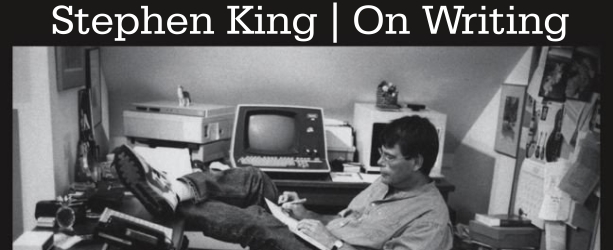On Writing.
On Writing: A Memoir of the Craft was one of those books I felt like I had to read, but didn’t really want to. Reading it was symbolic of entering my journey as a serious writer and it became apparent that this was the case when Stephen King said outright, “If you can take it seriously, we can do business. If you can’t or won’t, it’s time for you to close the book and do something else.” Well, then!
Fortunately, the more I read, the more at ease I became – it was a memoir after all. I learned a whole lot about the writer who I’d never read. I learned that he’s been inspired (and forced) to write since he was a youngin’. I learned that he had a knack for entertaining his peers with horror stories much to the dismay of his teachers who wondered why he “wasted his talent” writing “junk.” I was jealous that he got in trouble for selling stories. In high school, I didn’t get in trouble for anything and maybe that’s probably why I’m not a best-selling author.
Stephen King shared how he pinned rejection slips to his wall from publication after publication and made it apparent why he’s where he is today. He wrote about how ideas came to him and how he fleshed them out. For example, he was at the laundromat thinking about a job he had cleaning a girls’ shower, and also an article about telekinesis, when the idea for Carrie came to him. He admits to struggling through characters he didn’t like, and plotlines that he couldn’t finish. I started to really like the guy.
I was fascinated by his journey. Life’s handed him a fair share of bullshit – cancer, alcoholism, a major car accident – but in between he fell in love, married, had kids, and did a whole bunch of normal people things. He was both remarkable and plain. What made the difference is that he never stopped writing (and he had an awesome wife by his side). In the first pages of the book, he made it very clear: he’s always been a writer. By the time he begins discussing writing fundamentals you’re like, “Yep, this guy is legit.”
His actual writing tips weren’t bad to read either. He suggests all writers construct their own writing toolbox and carry it with them. At the top of his toolbox: vocabulary and grammar. Vocabulary should be grown naturally (because we all can tell when it’s forced), but writers are encouraged to put a little effort into their grammar. He scared the adverbs outta me and forced me to google participles and gerunds. Then King switched gears and started talking about writing on a broader scale.
“If you want to be a writer, you must do two things above all others: read a lot and write a lot.” This I liked. This made me pat myself on the back and go Woohoo! before diving more determinedly into the book. Another significant piece of advice: “Take your story through at least two drafts; the one you do with the study door closed and the one you do with it open.” He means this literally and figuratively. Don’t let anyone read your first draft before you’ve finished. If you’ve written, you may recall the distraction that comes from having external thoughts fed into an unfinished story. “Did you think about…?” “Is this significant…?” “I like the idea that..” It all dilutes and diverts your story.
The book actually covered a lot of ground and I was surprised at the number of pages I marked to refer back to. However, the parts that burned in my mind weren’t about writing at all. I told you I like memoirs, and I liked reading about King’s life more than anything else. In my complete ignorance of King’s life, I was surprised to learn that he let cans overflow in his garbage can and wrote whole novels battling alcoholism. He didn’t drag the book down with this bit of backstory – it actually resolved itself pretty quickly in the span of the book – but he made sure to remind you he wasn’t free of human frailties.
In fact, I again surprised to learn he’d been in a near-death accident. His body versus a light blue Dodge van. I cringed reading about his displaced hip and how his leg was fragmented like “marbles in a sock.” I felt this section; I loved and hated it. It’s always wonderful to look back on a traumatic situation knowing that it’s a story of survival instead of tragedy. I also prefer that bad things not happen in the first place. By the end of this book I was left with three thoughts:
Stephen King wrapped up the book with a list of his latest, bestest reads notably including the Jack Reacher novels, the Harry Potter books, and a bunch of well-rated novels that are sitting patiently on my Goodreads list. I was left with three thoughts:
- Writing should be taken seriously. Even though that may come with some strain.
- There are pre-requisites to good writing that I’ll probably iron out with some persistence and constructive criticism.
- The difference between me and Stephen King is that he’s been through a bunch of shit, but kept writing. I plan to work on the keep writing part and pray the bullshit passes me by.

